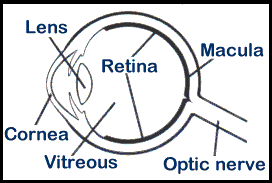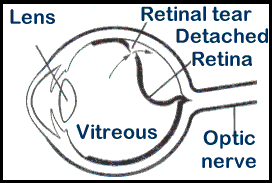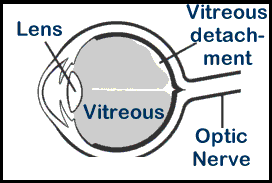What Are Floaters?
Floaters are dark specks in the form of dots, circles, lines, or cobwebs that seem to move across your field of vision. They are most noticeable when you are looking at a light-coloured background, such as a clear sky or a white wall. Floaters come in many sizes and numbers, and they seem to move when you look in different directions.
What Causes Floaters?
Floaters are small clumps of visible material within the vitreous. Although floaters seem to be in front of you, they are actually floating within the vitreous and the retina sees them as shadows. Sometimes floaters occur because your eye is irritated, or because there are crystal-like deposits in the vitreous.
As we get older, the vitreous shrinks and separates from the retina. As this separation occurs, floaters may appear. In about half of all people, the vitreous has separated from the retina by age 50, although many people are not aware that this process has occurred in their eye(s).
Normal Eye

Retinal Detachment

Vitreous Detachment

Most of the time, the vitreous separates from the retina without any problem. However in some people, the vitreous remains attached to parts of the retina, causing the retina to tear as the vitreous separates from it. There may be some bleeding into the vitreous associated with a retinal tear, which results in a new shower of floaters.
Tears in the retina should be repaired right away. A retinal tear can develop into a retinal detachment, which is a serious threat to vision. Retinal tears can usually be repaired without a hospital stay, but it may take a major operation to fix a retinal detachment.
Certain people, such as those who are nearsighted and those who have had a cataract operation or an eye injury, have a higher risk of retinal tears and retinal detachment.
How Do I Know If The Floaters Are Signs Of A Problem?
You will need a dilated eye exam by an ophthalmologist or eye care professional. He or she will pay particular attention to the hard-to-see areas of the retina, to find out whether the floaters are serious and due to a retinal tear that needs to be repaired. If you notice the sudden appearance of new floaters you should see your ophthalmologist.
What can I do about floaters?
Floaters may sometimes interfere with your vision, especially when you are reading. If a floater appears right in your line of vision, move your eye around. This makes the vitreous swirl around and moves the floater out of the way. Looking up and down rather than from side to side causes different currents inside the eye and may help to get the floater out of the way. Surgery is almost never needed specifically for floaters.
What Are Flashing Lights?
When flashing lights occur you may think that you see lights going on and off, especially to one side. These tend to happen in only one eye at a time, even when your eye is closed.
What Causes Flashing Lights?
The vitreous sometimes pulls on the retina. This may cause you to see flashing lights or lightning streaks, even though there aren't any such lights present. This is the same thing that occurs when you get hit in the eye and "see stars" or when you rub your eye. When the vitreous separates from the retina, you may see flashing lights once in a while, for a few weeks.
If you see jagged lines of light that last 10 to 20 minutes and happen in one or both eyes, this is probably a migraine caused by the spasm of blood vessels in the brain. If you develop a headache after, it is called a "migraine headache." If you don't develop a headache after, the light flashes are called "ophthalmic migraine," or "migraine without headache.
How Do I Know If The Flashing Lights Are Signs Of A Problem?
Most of the time the vitreous separates from the retina without causing any symptoms. Sometimes, however, there is a sudden occurrence of flashing lights with many new floaters or even with a blacking out of part of the field of vision. If this happens, you should see your ophthalmologist right away to find out if you have a retinal tear or retinal detachment
If There Is A Problem, What Treatment Will I Need?
Retinal tears require treatment to prevent the retina from detaching. Retinal detachment is a serious problem that often requires surgery.
© Copyright by the Canadian Ophthalmological Society
